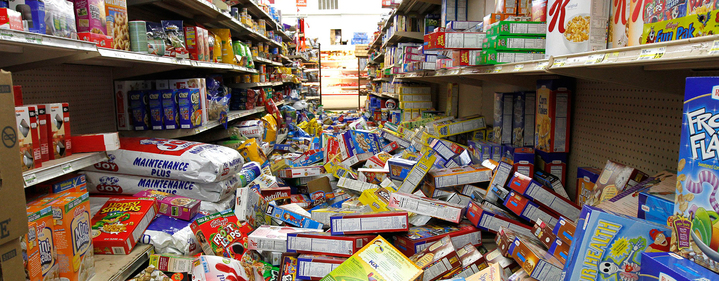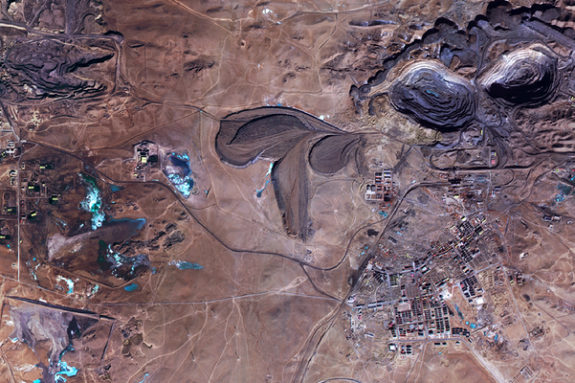Corporations and states drive the climate crisis, not individuals.
How often have we heard that the climate crisis is caused by our insatiable consumerism, our lack of environmental concern, rampant population growth, or the inherent selfishness of human nature? At the current rate of consumption, we would need 1.7 planets to sustain our way of life. So to avoid catastrophic climate change, we are counseled to eat vegan, travel less, turn off lights, drive electric cars. Some critics of consumption even believe that our buying habits are to blame for our stress and depression; they argue that we would be happier with less wealth. The solution to our climate emergency, they suggest, is individual willpower. Resisting the urge to consume would not only free us from misery by leading to a “simpler life”; it would also avert ecological disaster.
In the following points, we explain why this logic is grossly inadequate in the fight for climate justice.
1. The Problem Is Production
We are often told that the way to lessen the environmental impact of capitalist production is through ethical consumption. Products are produced only because people buy them; production, therefore, is driven by our desires. But if we really want to get to the root of the climate crisis, we have to go beyond consumption and understand the dynamics of production. This means not only asking who owns the factories and companies, but also understanding what is produced, how, and why.
Capitalism functions in such a way that production in our society must be ever expanding and competitive. The only reason to produce in capitalism is to earn a profit, which is used to accumulate more capital, which is used to earn more profit, and so on. Constant growth is the only way for a capitalist firm to out-compete other firms. Capitalist production thus depends on an ever-growing supply of natural resources and energy, usually in the form of fossil fuels. This is how environmental crises arise. It is actually quite simple: infinite growth (or accumulation) in a finite world is impossible.
In the capitalist system, production is not primarily determined by supply and demand, but by profit maximization, i.e., by maximizing production and thus consumption. The consequences of this logic can be seen in the staggering array of products that exist, many of which are discarded without ever being used. As much as 50 percent of food produced worldwide is thrown away before it even reaches our plates. Any rational or ethical constraints on production are nullified by the imperative to maximize profits.
In addition, a sizable proportion of emissions can be attributed to industries that don’t produce anything useful but instead exist solely to increase the profits of other industries. According to CarbonTrack, the advertising industry is responsible for 2 million tons of CO2 emissions in the UK alone, enough to heat 364,000 homes in the country for a year. Another example is the oil consumption of the US military, which at 100 million barrels a year is the biggest emitter worldwide. Furthermore, commodities are deliberately designed to not last very long, thus stimulating new consumption and generating further profits for corporations while the environment suffers the consequences.
2. The Climate Crisis Is a Class Issue
One of the main arguments of critics of consumption is that when it comes to the environment, we are all in the same boat, and we all contribute to slowly sinking it. While it is clear that the climate crisis is caused by human activity, this is only half the truth. If we take a closer look at which sectors emit the most greenhouse gases, we see that heavy industry and agriculture account for about three quarters of total emissions, according to the Intergovernmental Panel on Climate Change. Since 1988, one hundred corporations have been responsible for an incredible 71 percent of global CO2 emissions. And when it comes to waste, private industry generates far more than households. In 2016 construction, demolition, and commercial enterprises in Germany produced 278.7 million metric tons of waste (67 percent of total waste), while municipal waste accounted for “only” 52.1 million metric tons.
Even if we limit ourselves to the sphere of consumer habits, as critics of consumption so often do, it is clear that we are not, in fact, all in the same boat. Oxfam published a report some time ago that made it clear that the rich, with their luxury lifestyles, contribute quantitatively much more to our climate crisis than everyone else. Someone from the richest 1 percent is responsible for 175 times more emissions than someone from the poorest 10 percent. Fifty percent of emissions can be attributed to the richest 10 percent. In other words, the poorer classes, who are the most impacted by the climate crisis, contribute the least. It’s also much more difficult for the poor to adapt to the changing climate and recover from disasters. Not everyone can afford to hire private firefighters to protect their home, like Kim Kardashian and Kanye West did during the devastating California wildfires of 2018.
We must vigorously oppose the idea that “we are all responsible” for climate change. Not only is it blatantly false, but capitalists are using it to justify making the rest of us pay for the costs of a destabilizing climate. In France last year, a proposed increase in the gas tax, which was intended to encourage a transition to cleaner fuel, did not go down well with the population. It triggered the largest and most violent uprising the country had seen in fifty years—the gilets jaunes movement. If “eco-taxes” are imposed on consumer goods, it will mean that only a select number of people will be able to afford them, thus aggravating social inequality. Critical consumption leaves no room for the question of class and is therefore a gift to the capitalists, who want to force us all to pay for a crisis they caused.
3. Critical Consumption Demobilizes
Critical consumption is oriented towards individual actions. But radical social change has only ever been realized through hard-fought collective battles. The eight-hour work day, the right of women to vote, the right of African Americans to vote in the US, the minimum wage, and the end of Apartheid in South Africa were only achieved through mass organization and cooperation. During an organized struggle, people not only become aware of their political and social position in an unjust system; they also practice democracy together, something capitalism denies us. Critical consumption serves as a personal compensation for the feeling of powerlessness that capitalism fosters. We feel good because we think that by buying some products and refusing others, we can have an actual say in our society. But the belief that we can overcome the climate crisis by buying differently falls into the trap of neoliberal individualistic ideology, which divides and demobilizes us.
4. Critical Consumption Is an Obstacle to Unifying Separate Struggles
The climate crisis is intensifying many existing injustices. Fighting them means understanding separate struggles as part of a bigger picture and uniting them in practice. Since critical consumption gets bogged down in individual actions, it hinders this necessary unification.
For example, we cannot talk about the climate crisis unless we also talk about European border policy, which lets thousands of climate refugees drown, even though industrialized countries were responsible for 80 percent of all CO2emissions in the twentieth century. Greenpeace forecasts about 200 million climate refugees by the year 2040 unless there is radical systemic change. A humane solution to the flow of climate refugees (which in the future could also be us) depends on building a solidarity-based, anti-racist society today and halting the advances of the far right.
The new student strike “Fridays for Future” is an inspiring unifying struggle. Swedish high school student Greta Thunberg, who initiated the weekly strikes, asked why she should bother to learn when she has no future. Inspired by her, high school and university students from many countries have been refusing to attend classes every Friday. This movement shows the immense importance of international cooperation, which has always been an essential part of changing the world. If we want to fight climate change, we cannot confine our struggles within national borders.
A further ally of the environmental movement is the historical demand for fewer working hours at the same wage. Besides greater health and happiness for workers, less work and more leisure time mean that less is produced and emissions decline.
The struggles of Indigenous peoples around the world are also closely linked to climate justice. The NoDAPL movement in the US was about protecting Indigenous sacred burial sites and groundwater from oil pipelines. The movement inspired thousands of people to travel to North Dakota and join the blockade, from trade unionists, to environmental activists, to veterans.
5. No Right Consumption in a Wrong World
We want to make clear that we do not oppose individual decisions inspired by an ecological conscience. We even welcome these actions and underline their importance for a future sustainable socialist society. We know it is impossible to sustain, for example, the current mode of agriculture and livestock production, which account for 51 percent of all emissions, or the current level of commercial air travel, whose emissions have multiplied tenfold in the last forty-five years. This is not sustainable in capitalism or in socialism. However, we are convinced that the focus on individual consumption, and slogans such as “go vegan,” do not provide a broad political basis for mobilizing people to change the world. Climate justice needs a clear political dimension; it must be a large-scale collective struggle that can achieve far-reaching positive changes.
Our task as socialists is not only to confront the climate crisis and its effects, but also to “overthrow all relations in which man is a debased, enslaved, abandoned, despicable essence” (Marx), and thus end class society and the exploitation of human beings. Changes in consciousness occur when people come together and fight. This is why we are opposed to a politics based on pointing the finger at the “wrong” form of consumption from a position of moral superiority. This weakens real struggles and remains within an elitist academic space.
We want to encourage everyone to organize and work together for political change. We must not stop at criticizing the existing social and ecological problems in the world; we also have to change our reality. Only if we are many and fight together can we hope to avoid the worst effects of the climate crisis and found a world based on solidarity, justice, and sustainability. We believe in change, because history has shown that many past efforts at radical change that were deemed utopian and unrealistic at the time ultimately prevailed.





